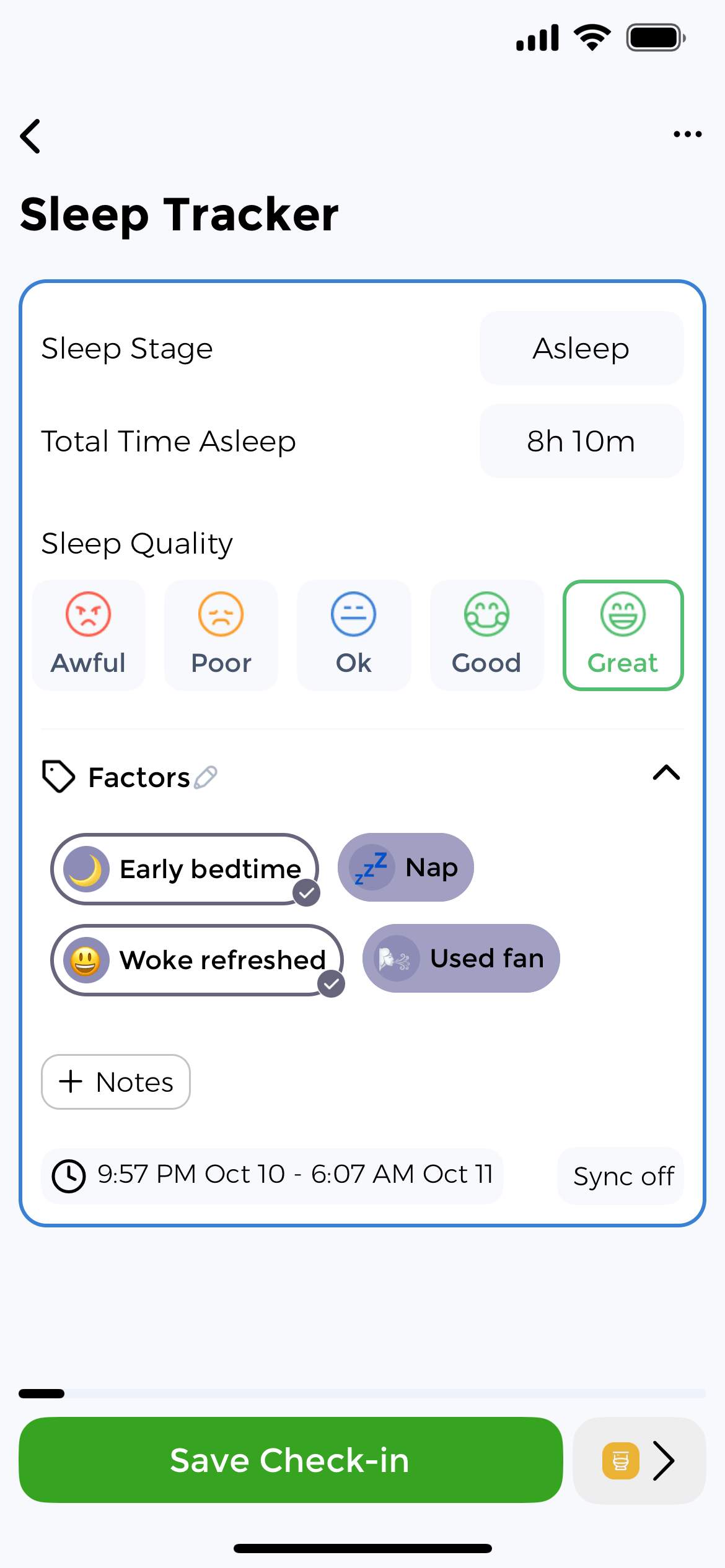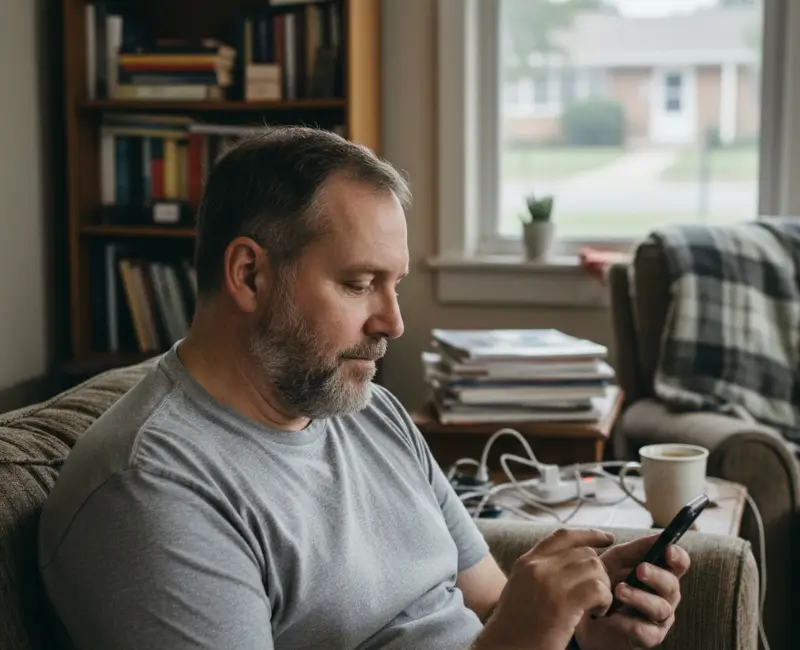Sleep Tracker
Discover what affects your sleep quality and make simple changes to wake up refreshed and energized each morning.
Missing quality sleep affects your energy, focus, mood, and overall health. Without tracking sleep patterns, it is difficult to identify what is disrupting your rest or how to improve it. CareClinic’s sleep tracker helps you understand your sleep stages, monitor duration and quality, and discover what factors impact your rest each night.
Understand Your Sleep Cycle
Your brain goes through different sleep stages every night. Light sleep, deep sleep, and REM sleep each play a unique role in restoring your body and mind. Deep sleep is essential for physical recovery and immune system function, while REM sleep supports memory, learning, and mental restoration.
With the best sleep tracker integrated into CareClinic, you can monitor how much time you spend in each sleep stage. Track your total sleep duration, sleep quality scores, and sleep efficiency. The app works with wearables like Fitbit, Apple Watch, Garmin, and Oura to automatically log your sleep data, or you can manually record your rest each morning.
Understanding your sleep patterns helps you identify issues like insufficient deep sleep or fragmented REM cycles that affect how refreshed you feel each day.
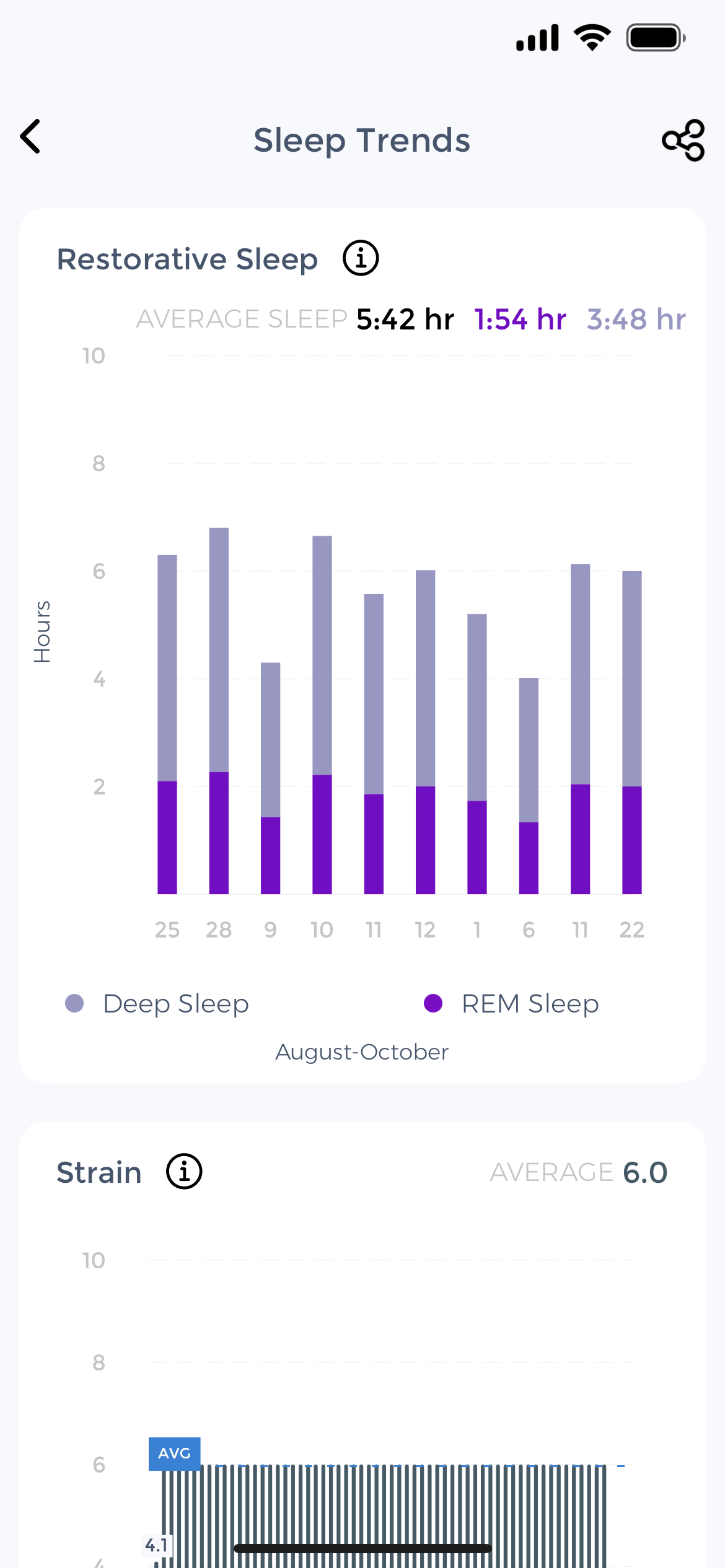
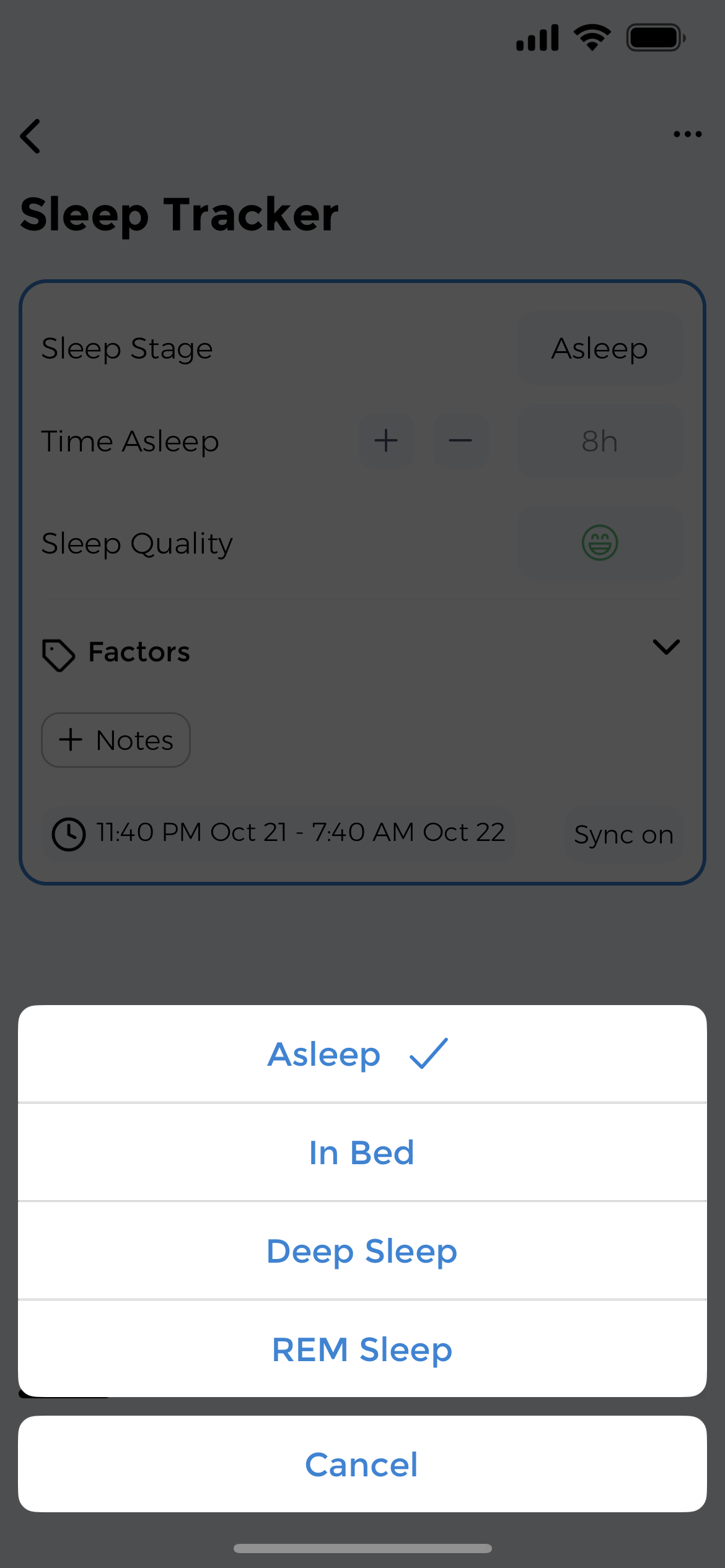
Record Sleep Metrics
Quality matters as much as quantity when it comes to sleep. The sleep tracker lets you record Time in Bed, Time Asleep, Deep Sleep, and REM Sleep for precise tracking, functioning as a comprehensive sleep diary. Rate your Sleep Quality each morning and log any factors that affected your rest like caffeine intake, stress levels, exercise timing, or screen time before bed.
Track your sleep schedule consistency by logging your bedtime and wake time each day. Maintaining a regular sleep-wake rhythm helps regulate your body’s internal clock and improves overall sleep quality. Add notes about sleep disruptions, nighttime awakenings, dreams, or anything else that impacted your night.
The app also lets you monitor related health factors that impact sleep. Track your mood, physical activity, nutrition, and vital signs to see how they correlate with your sleep patterns.
Answer All Your Sleep Questions
Track everything from sleep duration and quality to sleep stages and disruptions so you can wake up feeling refreshed and energized every morning.
Sleep Duration Tracking
Log how many hours you sleep each night and compare against your sleep goal to ensure adequate rest for recovery and health.
Sleep Stages Monitoring
Track time spent in light sleep, deep sleep, and REM stages when synced with compatible wearables like Fitbit or Apple Watch.
Sleep Quality Rating
Rate how well you slept each night on a simple scale and track quality trends over time to measure improvement.
Sleep Schedule Consistency
Monitor your bedtime and wake time patterns to identify consistency and build healthier sleep routines over time.
Sleep Disruptions Log
Record nighttime awakenings, restless sleep, or sleep disturbances to identify patterns and potential causes affecting your rest.
REM Sleep Tracker
Monitor your REM sleep duration. This stage is crucial for memory consolidation, learning, and emotional processing.
Deep Sleep Monitoring
Track deep sleep stages that restore your body, boost immune function, and repair tissue and muscles.
Morning Energy Levels
Rate how energized you feel each morning to correlate with sleep quality and identify what affects your daily performance.
Sleep Factor Tracking
Log factors that impact sleep like caffeine, alcohol, exercise, stress, or screen time to discover what helps or hurts your rest.
Sleep Environment Notes
Track room temperature, noise levels, light exposure, and other environmental factors affecting your sleep.
Sleep Goals
Set personalized sleep duration and quality goals based on your needs and track progress toward achieving consistent rest.
Sleep Medication Tracking
Monitor sleep aids, supplements, or medications and correlate them with sleep quality to assess effectiveness.
Sleep Timer
Use the built-in timer to log Time in Bed precisely. Start when you get into bed and stop when you wake up for accurate sleep duration tracking.
Sleep Sounds
Access calming soundscapes and white noise directly in the app to help you fall asleep faster and maintain deeper rest throughout the night.
Dark Mode Interface
Track your sleep trends in a comfortable dark mode that reduces eye strain when checking data at night or first thing in the morning. Easy on your eyes before bedtime.
Syncs with Sleep Tracking Devices
Connect your wearable sleep trackers and fitness devices to automatically import sleep data into one unified sleep log. CareClinic integrates with Fitbit, Apple Watch, Garmin, Oura Ring, Samsung Health, and other popular sleep monitoring devices. Your manual sleep diary entries merge seamlessly with device data to create a complete picture of your rest patterns.

Apple Health

Fitbit
Garmin
Oura Ring
Samsung Health

Google Fit
What You Should Track
Identify patterns in your sleep disruptions and discover the specific factors that are affecting your ability to get quality rest every night.
Insomnia & Sleep Onset
Track difficulty falling asleep and identify what factors make it harder or easier to drift off at night. Monitor insomnia patterns and share data with your healthcare provider.
Nighttime Awakenings
Log how often you wake during the night and what triggers these disruptions. Discover if certain foods, stress, or environmental factors are causing fragmented sleep.
Sleep Apnea Symptoms
Track snoring, breathing pauses, morning headaches, and daytime fatigue that may indicate sleep apnea. Record these symptoms to discuss with your doctor.
Restless Sleep
Monitor tossing and turning, restless legs, or general sleep discomfort. Track correlations with diet, exercise timing, or stress levels to find relief.
Poor Sleep Quality
Rate your sleep quality each morning and identify patterns that lead to unrefreshing sleep. See how lifestyle changes impact how rested you feel.
Morning Fatigue
Track energy levels upon waking and throughout the day. Correlate with sleep duration, quality, and disruptions to understand why you wake up tired.
Identify Sleep Patterns
See how your daily habits affect your sleep quality through visual charts and correlation insights.
Log Daily Activities
Check in manually or use Apple Health or Google Fit integrations to pull in data. Track sleep alongside exercise, meals, caffeine intake, stress levels, screen time, and medications. The app captures everything that might affect your rest.
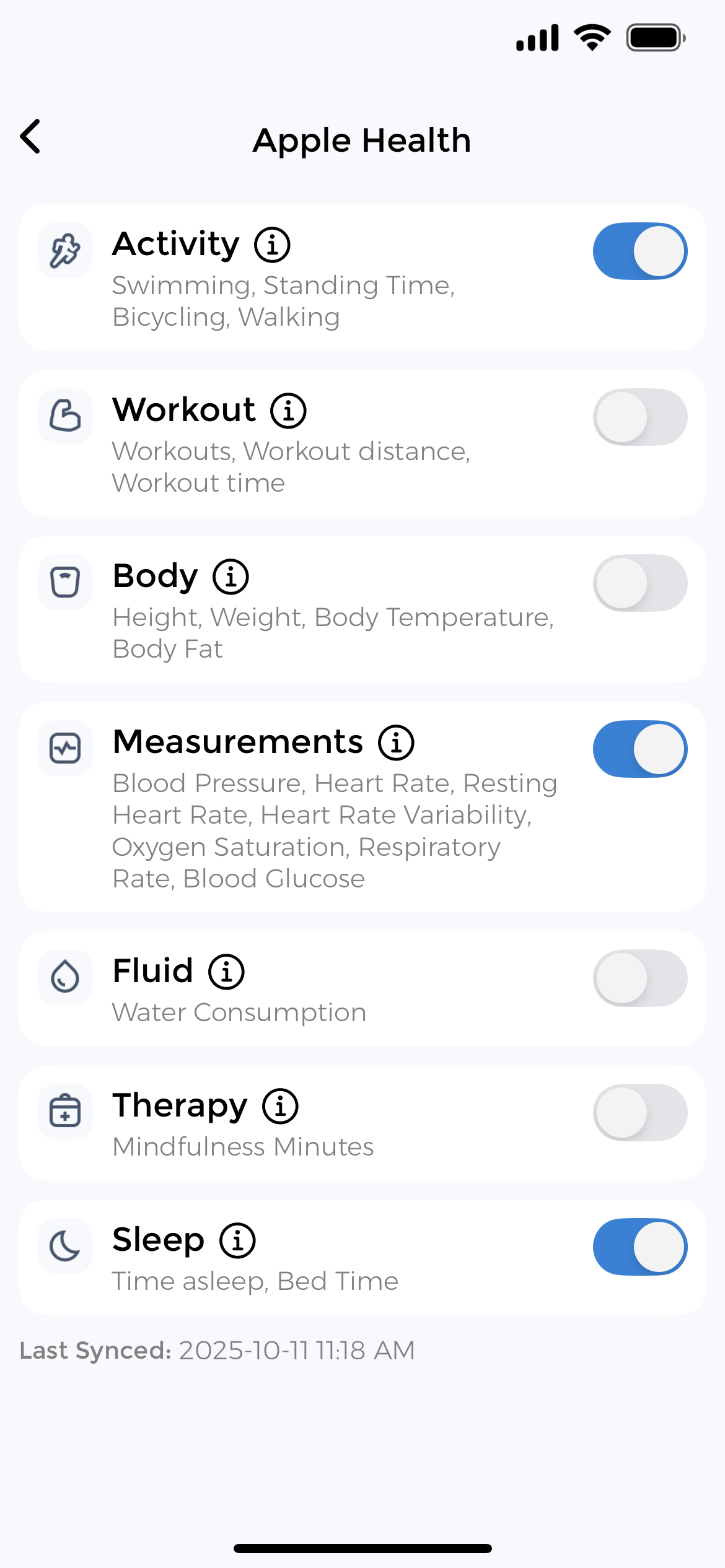
Discover Correlations
The app analyzes relationships between your activities and sleep quality. See how late afternoon coffee impacts sleep onset, or how evening workouts affect deep sleep. Charts reveal patterns you might otherwise miss.
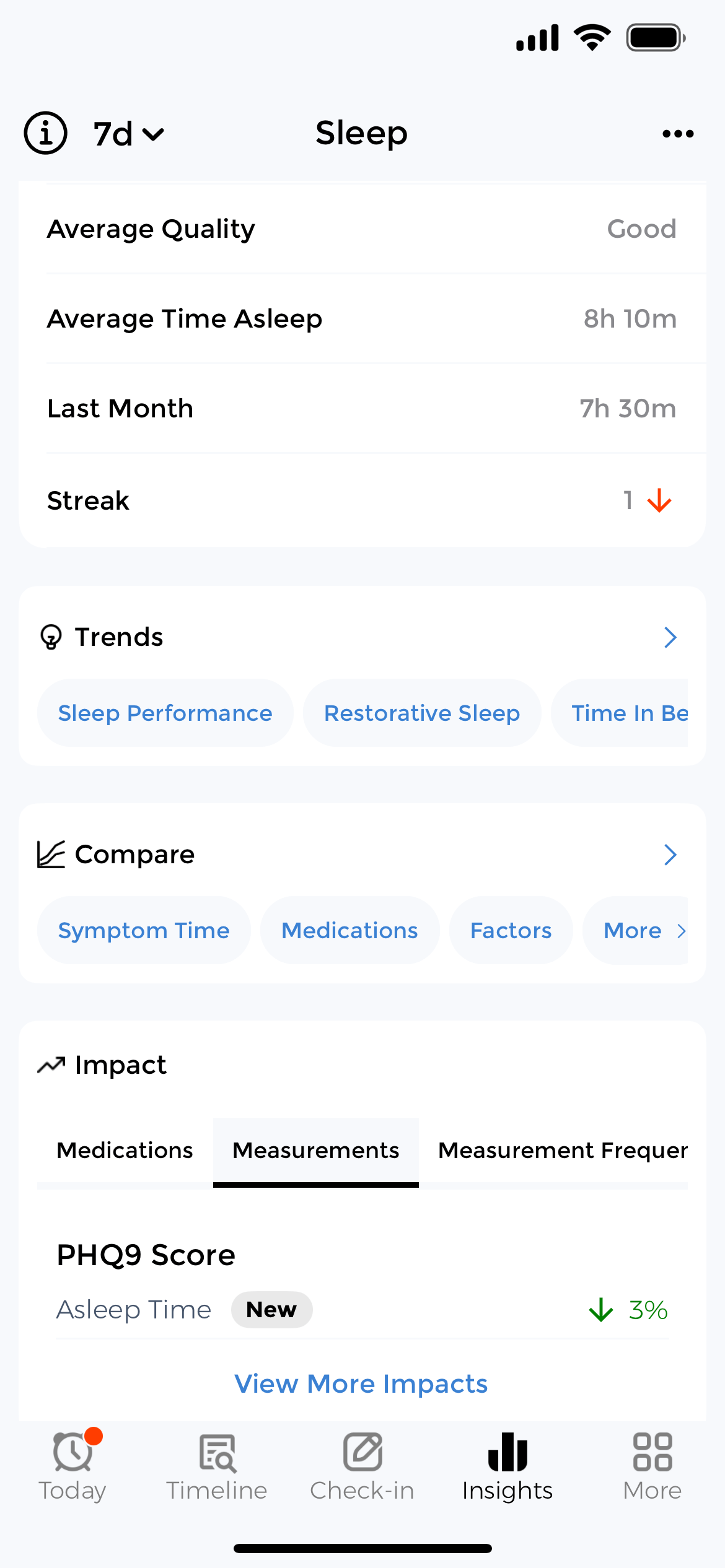
Improve Your Sleep
Use insights to make informed changes. Share detailed sleep reports with your doctor to address insomnia, sleep apnea symptoms, or chronic fatigue. Your sleep log becomes a powerful tool for improving your overall health.
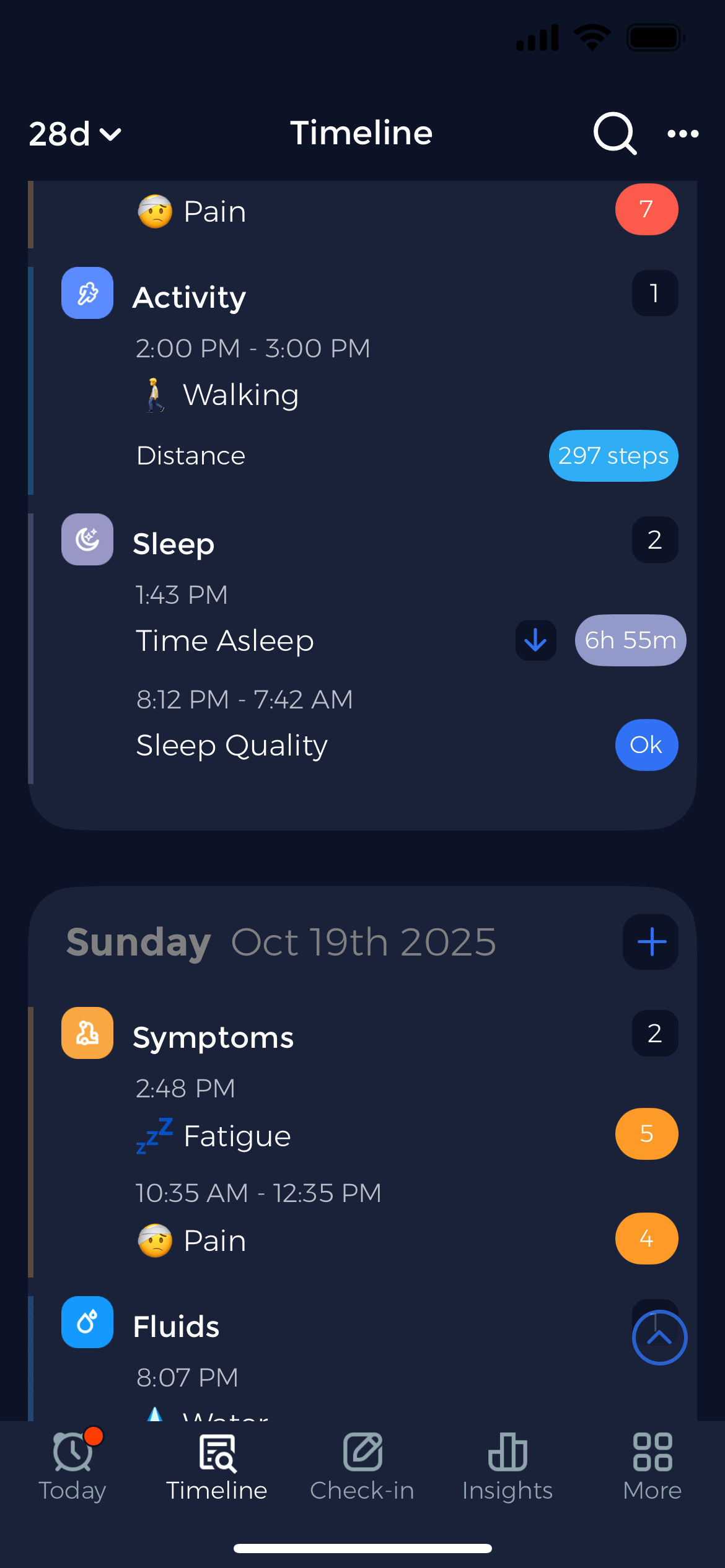
Track Related Health Factors
See the complete picture of what helps or hurts your sleep by tracking all the factors that impact your rest. CareClinic correlates your sleep data with exercise, nutrition, mood, medications, weather, and vital signs to reveal exactly which daily habits are disrupting or improving your sleep quality.
Exercise & Sleep
Track physical activity and see how exercise timing and intensity affect your sleep quality and ability to fall asleep.
Diet & Nutrition
Log meals, caffeine, and alcohol intake to identify how diet choices impact your sleep onset and quality throughout the night.
Mood & Stress
Monitor daily mood and stress levels to understand how emotional state and anxiety affect your ability to rest well.
Medications & Supplements
Track sleep medications, melatonin, or other supplements and correlate them with sleep quality to measure effectiveness.
Weather & Environment
Correlate weather conditions, temperature, and barometric pressure with sleep quality to identify environmental triggers.
Heart Rate & Vitals
Monitor resting heart rate, heart rate variability, and blood pressure to see how sleep quality affects cardiovascular health.
Built-in Sleep Toolkit
Use the built-in sleep timer to track time in bed precisely, play calming sounds to help you fall asleep faster, and review your sleep trends in comfortable dark mode that is easy on your eyes.
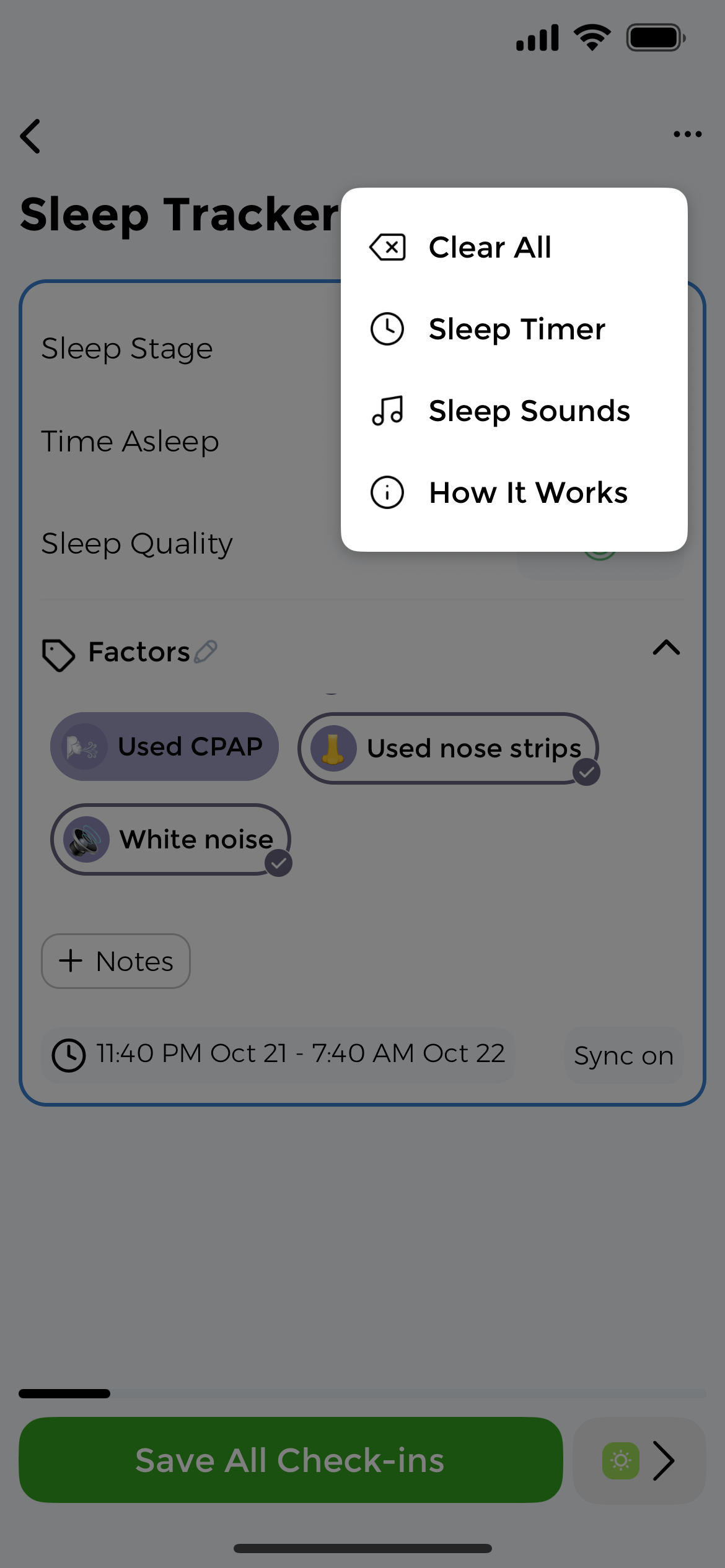
Sleep Timer
Start the timer when you get into bed and stop when you wake up. Accurately log Time in Bed for precise sleep duration tracking without manual calculations.
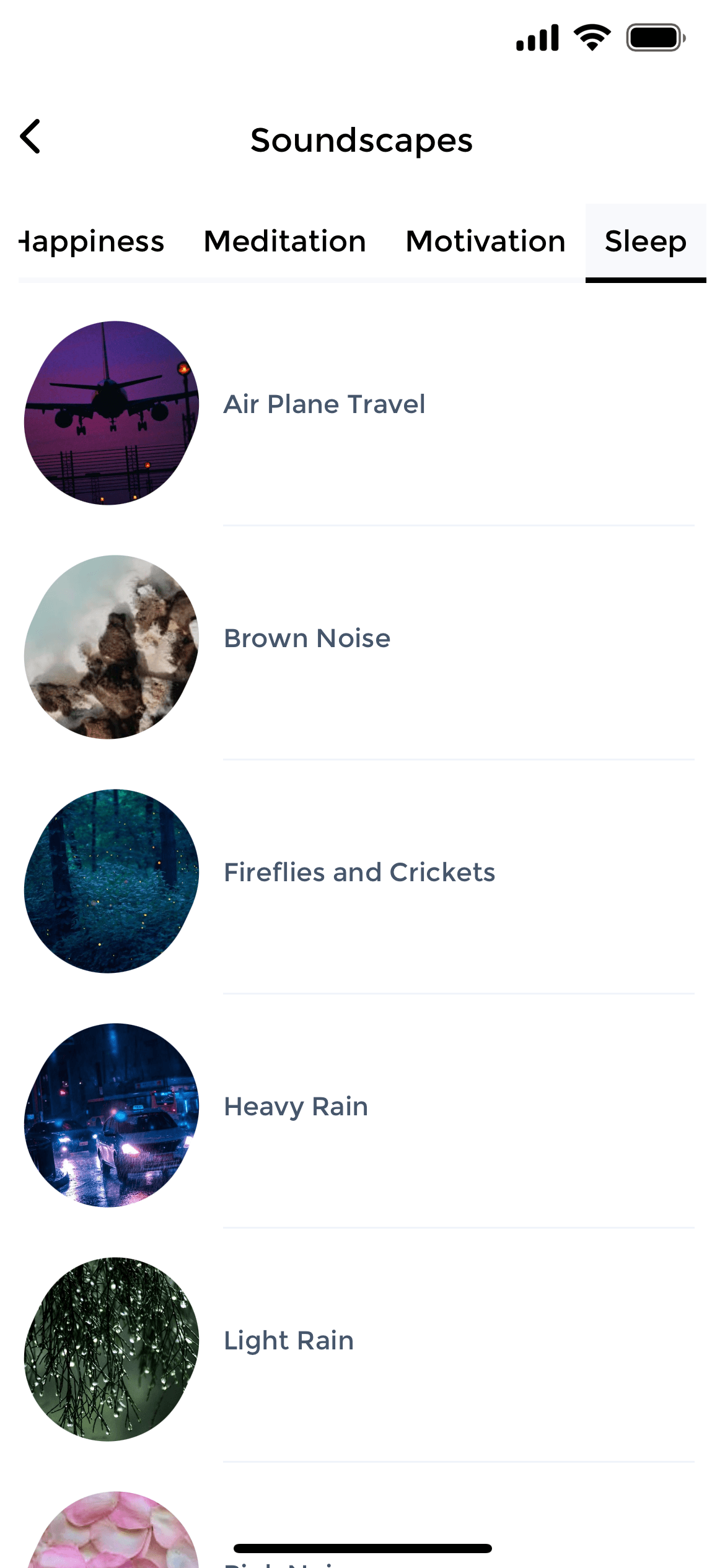
Sleep Sounds
Choose from calming soundscapes, white noise, rain, ocean waves, and nature sounds. Play soothing audio directly in the app to help you fall asleep faster and stay asleep longer.
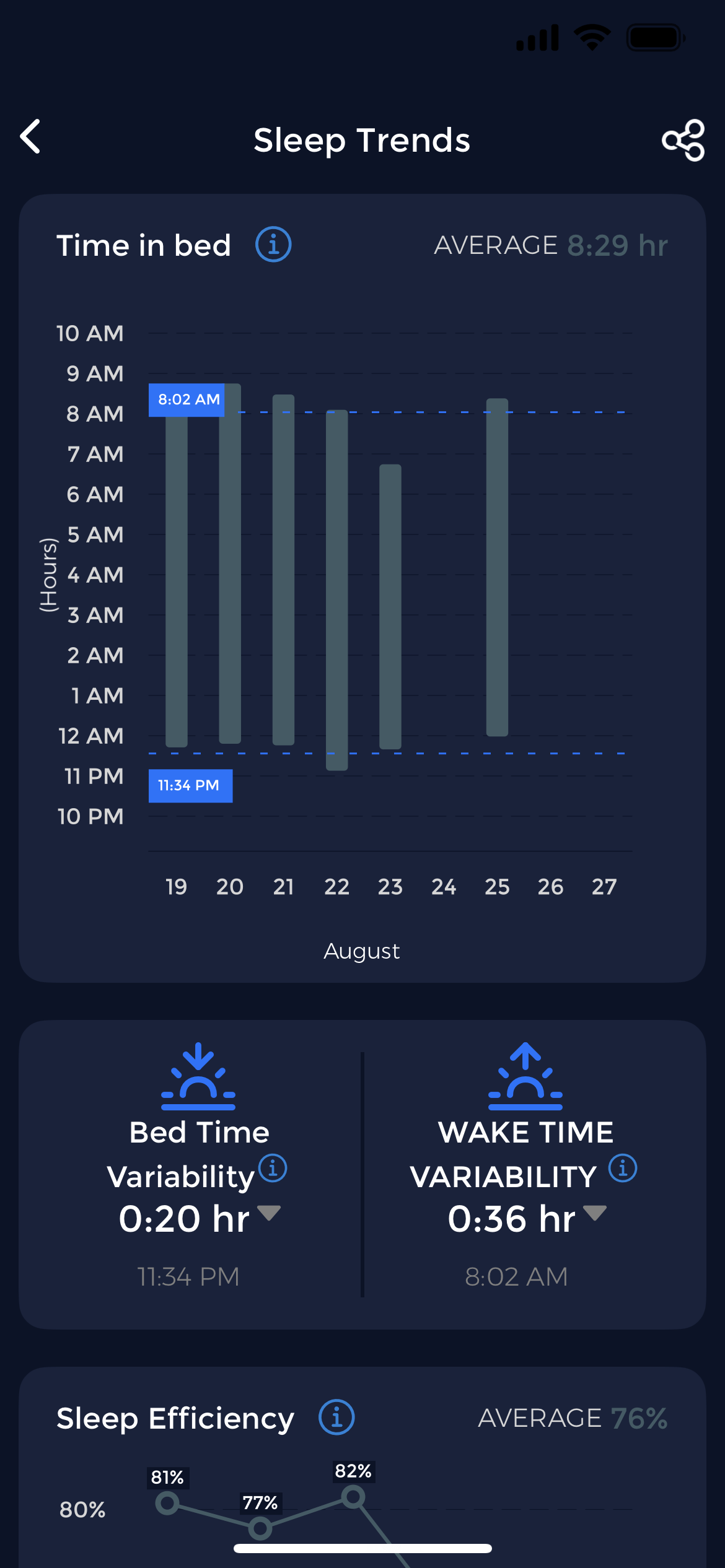
Dark Mode
Track your sleep trends in a comfortable dark mode interface that reduces eye strain when checking data at night or first thing in the morning. Easy on your eyes before bedtime.
Sleep Success Stories
Real stories from people who discovered their sleep disruptors, optimized their routines with data-driven insights, and achieved measurable improvements in deep sleep, REM sleep, and daily energy levels. See how tracking patterns led to 40% better deep sleep, 50% more REM sleep, and smarter medication timing for restful nights.
The Science of Sleep
Understanding how sleep works helps you make better decisions about your rest and overall health.
Non-REM Sleep Stages
Non-REM sleep has four stages, from light sleep to deep sleep. Stage 1 is the transition between waking and sleeping. Stage 2 is light sleep where your heart rate slows. Stages 3 and 4 are deep sleep—the most restorative phase where your body repairs tissue, builds muscle, and strengthens the immune system.
REM Sleep Function
REM sleep is when your brain is most active. Your eyes move rapidly behind closed eyelids, breathing quickens, and vivid dreams occur. This stage is crucial for memory consolidation, learning, emotional processing, and brain development. You typically cycle through 4-5 sleep cycles each night, with REM stages getting longer as morning approaches.
Your Body Clock
Your internal circadian rhythm regulates when you feel sleepy and alert. Adenosine builds up in your brain while you’re awake, creating sleep pressure. At night, your body releases melatonin in response to darkness, signaling it’s time to sleep. In the morning, cortisol rises to help you wake up. Light exposure, meal timing, and consistency affect this rhythm.
Sleep Health Research
Getting enough quality sleep supports your cognitive function, immune health, metabolism, and emotional wellbeing every single day.
Completely Private and Secure
We protect your sleep logs and health information with bank-level encryption, HIPAA compliance, and biometric security features. You control exactly who sees your data, and your information is never sold or shared without your explicit permission.
Frequently Asked Questions
Common questions about tracking sleep, choosing devices, and improving your rest through data-driven insights.
The best sleep tracker combines wearable device integration with comprehensive sleep logging. CareClinic syncs with Fitbit, Apple Watch, Garmin, Oura, and other sleep tracking devices while letting you log sleep quality, factors affecting rest, and correlations with daily habits. This gives you the most complete picture of your sleep patterns.
Sleep tracking apps use data from wearable devices like fitness trackers that monitor movement, heart rate, and breathing patterns throughout the night. These sensors detect when you are in light sleep, deep sleep, or REM sleep. You can also manually log sleep duration, quality ratings, and factors that affected your rest. The app analyzes this data to show patterns and trends over time.
Yes, you can manually track your sleep in CareClinic without any wearable devices. Simply log your bedtime, wake time, how many hours you slept, and rate your sleep quality each morning. Add notes about factors that affected your sleep like caffeine, stress, or exercise. While wearables provide more detailed sleep stage data, manual logging still reveals valuable patterns over time.
Wearable sleep trackers like Oura Ring, Fitbit, Apple Watch, and Garmin devices are considered among the most accurate for consumer sleep monitoring. They use heart rate variability, movement sensors, and respiratory rate to estimate sleep stages. Medical-grade sleep studies (polysomnography) are the gold standard, but quality wearables provide reliable data for tracking personal sleep trends and improvements.
To increase deep sleep, maintain a consistent sleep schedule, exercise regularly (but not within 3 hours of bedtime), keep your bedroom cool (65 to 68 degrees Fahrenheit), avoid alcohol and caffeine in the evening, and create a relaxing pre-sleep routine. Track these factors in CareClinic along with your deep sleep percentage to see which changes make the biggest difference for you.
Yes, sleep tracking helps identify patterns and triggers that contribute to insomnia. By logging factors like stress levels, caffeine intake, screen time, and exercise, you can discover what worsens your sleep problems. Share your sleep logs with your doctor to guide treatment decisions. Cognitive behavioral therapy for insomnia (CBT-I) often uses sleep diaries as a core component of treatment.
CareClinic integrates with major wearable sleep tracking devices including Fitbit, Apple Watch (via Apple Health), Garmin, Oura Ring, Samsung Health, Google Fit, and other devices that sync with Apple Health or Google Fit. Sleep data automatically imports into your CareClinic sleep log, where you can add context, notes, and correlate with other health factors you are tracking.
The CareClinic app lets you track your sleep schedule by logging bedtime and wake time each night. Set daily reminders to maintain consistency. The app shows patterns in your sleep-wake rhythm and helps you identify whether irregular timing affects your sleep quality and energy levels.
CareClinic tracks sleep duration, bedtime and wake time consistency, caffeine and alcohol intake, exercise timing, stress levels, room temperature, and screen time before bed. These factors directly impact sleep onset and quality. Correlating them with your sleep ratings reveals what improves or disrupts your rest.
Sleep trackers reveal patterns you cannot see without data. CareClinic identifies what disrupts your sleep, shows how lifestyle changes affect rest quality, and provides objective evidence for conversations with healthcare providers. Consistent tracking leads to measurable improvements in sleep duration, quality, and daytime energy.
The CareClinic app helps you log sleep apnea symptoms like snoring, breathing pauses, morning headaches, and excessive daytime fatigue. Tracking these symptoms creates a detailed record you can share with your doctor for diagnosis. The app also monitors CPAP adherence and effectiveness if you are already receiving treatment.
Tracking sleep with CareClinic helps you achieve consistent sleep schedules, identify disruptive habits, and optimize sleep duration. Better sleep strengthens immune function, improves cognitive performance, regulates metabolism, and reduces risks for chronic diseases like diabetes and cardiovascular problems. Data-driven sleep improvements lead to measurable health gains.
Daily sleep tracking reveals long-term patterns that occasional logging misses. CareClinic identifies subtle trends, seasonal variations, and gradual improvements over weeks or months. Consistent data helps you understand how medications, stress cycles, or health conditions affect sleep, enabling more effective interventions.
Yes. Even without obvious problems, CareClinic helps optimize sleep timing, duration, and quality for peak performance. Tracking establishes baselines that help you catch emerging issues early. Understanding what maintains your good sleep protects against future disruptions from stress, aging, or life changes.
CareClinic lets you log each awakening with time and duration. Note what caused the disruption like noise, bathroom trips, pain, or anxiety. The app analyzes frequency and timing patterns to identify whether disruptions relate to diet, medications, or environmental factors. This data guides targeted solutions.
The best sleep tracker apps include wearable device integration, manual logging options, sleep quality ratings, factor tracking (caffeine, exercise, stress), correlation analysis, trend charts, customizable reminders, and shareable reports. CareClinic provides all these features plus connections to mood, nutrition, and medication tracking for comprehensive sleep health management.
Yes. CareClinic generates detailed sleep reports showing trends, patterns, and correlations you can export as PDFs or share securely with healthcare providers. These reports include sleep duration, quality scores, disruptions, and related factors that help doctors diagnose conditions like insomnia, sleep apnea, or circadian rhythm disorders.

